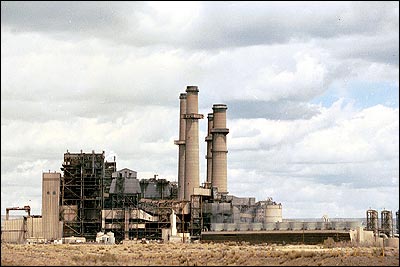
Countdown to Earth Day
April 7, 2004

Photo credit: PNM
“One of the problems in talking about air pollution is that it sounds like yesterday’s problem. Most of us can hardly remember a time when there wasn’t a concern about all the man-made poisons in the air, and demands that something be done about them. Most of us even think that something has been done already.”
- Isaac Asimov and Frederik Pohl in The Angry Earth
How do humans affect the composition of the atmosphere?:
• Releases from most industrial operations;
• Burning of fossil fuels for energy production;
• Biomass burning;
• Removing carbon “sinks” (as in logging and clearing rain forest areas);
• Automobile and other vehicle use.
Learn more about air pollution at the U.S. EPA’s web page:
http://www.epa.gov/ebtpages/air.html
Reducing our consumption and being more efficient in how we - individually - use electricity will result in lowered emissions from power plants. And reducing energy consumption can put dollars back in your pocket. Here are a few simple things you can do that will have a dramatic effect on your utility costs:
• By insulating your ceilings and walls, you can save about 25% in home heating bills.
• By turning down your central heating thermostat only one degree, your fuel consumption can be cut as much as 10%.
• Lighting accounts for 20% of the total electricity consumed in the United States. The biggest single action Americans can take to reduce electricity consumption is to replace their incandescent light bulbs with compact fluorescent bulbs. While initially more expensive, a compact fluorescent (CFL) bulb will last 13 times as long as a standard light bulb - and only consumes 20% of the electricity for the same light output. And you’ll save money; for example, replacing a 100-watt incandescent with a 32-watt CFL can save you at least $30 in energy costs over the life of the bulb. Find out more about compact fluorescents and where to buy them at http://www.energystar.gov/index.cfm?c=cfls.pr_cfls .
• Hot water heaters account for an estimated 20% of all energy used in U.S. homes. Refrigerators consume 7% of the electricity produced in the U.S. - about equal to the output of 25 large power plants. When replacing old appliances, choose those with a high energy efficiency rating. Over a several year period, your wallet will thank you - as will your planet.
The Government’s Energy Star web page can give you a lot more tips on how to save money on energy costs - which will result in reduced power plant emissions as well.
http://www.energystar.gov/index.cfm?c=home.index
Climate Solutions has additional practical ways we can all reduce air pollution and reduce global warming. Visit them at:
http://www.climatesolutions.org/